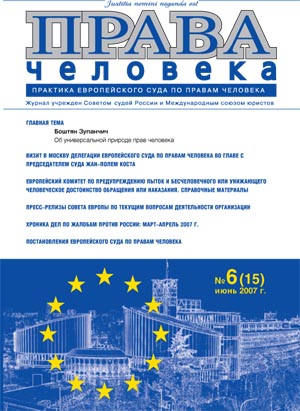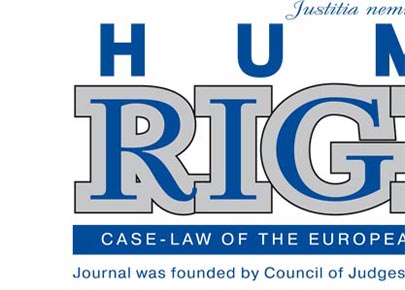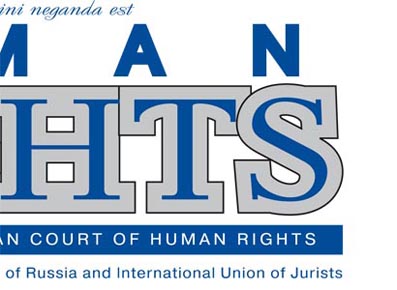
№ 6 (15)
Lately, the European Court of Human Rights was being criticised not only by individuals who were unsuccessful in applying to the Court, but also by some Russian State bodies (there is always someone who is displeased with a court). So, the State Duma of the Russian Federation Federal Assembly, while criticising the Court, failed to decide upon the ratification of the Protocol No. 14 to the Convention (in more detail, please see the material published in the 2nd issue of the journal, 2007). Mass media in Russia attempt to depict the European Court not as the body of justice but as an instrument of some «politics». It is hard for me to concur with such allegations. Having worked with the Court for a rather long period, actually for seven years now, I happened to see a «multifarious Court», but in any case I dare to assert that this institution is an important, indeed a very important judicial instrument of human rights protection in the European legal arena. The Court was formed not against someone: it is an instrument called upon to assert and promote uniform principles of human rights protection in the European community of nations. Undoubtedly, the Court erred, errs and shall err, and it seems that such erring include its judgments or decisions in Sisojeva and others v. Latvia, Ilaşcu and Others v. Moldova and Russia, Kolosovskiy v. Latvia, although there were judgments or decisions a contrario, in particular in the cases of Slivenko v. Latvia, ОАО Plodovaya Kompaniya v. Russia, Klimentiyev v. Russia.
In order to be able to understand the grounds and reasons for criticised judgments and decisions, as well as legal consequences of them, as regards other cases and enforcement of the Court’s judgments, inter alia, in the case of Ilaşcu and Others v. Moldova and Russia (no. 48787/99), we shall begin, in the next issues of the journal, publishing judgments of the Chamber and the Grand Chamber of the European Court of Human Rights in the case of Sisojeva and others v. Latvia and other relevant material.
On 7 June 2007 the European Court delivered its judgment in the case of ОАО Plodovaya Kompaniya v. Russia, whereby the European Court completely dismissed the applicant company’s claims under Article 1 of the Protocol No. 1 to the Convention and Article 6 of the Convention and held that there were no separate issues under Articles 13 and 14 of the Convention. This judgment has determined, in favour of the Russian Federation, a long-term dispute over alleged interferences with the right to the peaceful enjoyment of possessions, the right to a fair trial, the right to effective remedies and over alleged discrimination of an initially Russian and subsequently foreign company, which had become a holder of trademarks to vodka products, in breach of the law.
The outcome of the examination of the dispute may become determinative in many respects for numerous litigations in the countries of Europe and Americas. We publish the translation of the text of the above judgment in the current issue of the journal. It is of big importance that, in the case, the European Court held that if the applicant did not have a «civil right» recognisable under domestic law there was no basis for the rights guaranteed by Article 6 § 1 to arise. The stance is sequential to the case-law of the European Court developed and fixed by the Court, inter alia, in Hamer v. France, judgment of 7 August 1996, Reports1996-III, pp. 1043-44, § 73; Zhigalev v. Russia, no. 54891/00, 6 July 2006; Association de défence des intérêts du sport v. France (dec.), 10 April 2007, and many others cited in the judgment. Simply speaking, the European Court clearly holds that only those rights and titles are afforded protection under the Convention, which were acquired by an applicant legitimately. In the instant case, the Plodovaya Kompaniya public corporation was not a legal successor of the State enterprise and therefore it could not be a holder of the trademarks to famous vodka brands.
On 23 May 2007, the panel of five judges called upon to consider requests for referral of cases to the Grand Chamber rejected the request to re-examine the Chamber’s judgment of 13 November 2006 in the case of Klimentiyev v. Russia, whereby the Chamber unanimously had found no violation of Article 6 of the Convention in the proceedings in the much-talked-of case in the City of Nizhniy Novgorod. On the same date, 23 May 2007, the judgment became final.
Apropos, this is not the first case upon an application against Russia whereby the Court finds no violation on the part of the Russian authorities. Let our readers (as well as certain mass media, which «straightforwardly» fail to take notice of such category of the Court judgments) be reminded that between 1999 and 2006 there were 7 judgments finding no violations on the part of the Russian authorities versus 197 judgments delivered against Russia, however there were dozens of cases earlier communicated to the Russian Federation that were declared inadmissible or struck out of the Court’s list of cases in the light of the reached friendly settlement. In the year of 2007, as we assessed, there were already more than a quarter of decisions and judgments in such cases. On top of the cited above judgments in ОАО Plodovaya Kompaniya v. Russia, Klimentiyev v. Russia let us note judgments in the cases of Gavrikova v. Russia (15 March 2007), Shabalin v. Russia (nos. 75025/01, 75026/01 75027/01, and others, 12 April 2007), Vozhigov v. Russia (26 April 2007), Zagorodnikov v. Russia (7 June 2007), not counting over twenty decisions and judgments of the Chambers on inadmissibility and striking out a case from the Court’s list… Some of them will be published by the journal soon.
The very beginning of 2007 was marked by changes in the leadership of the European Court. A visit of the new President of the Court, Mr Jean-Paul Costa, in our country was one of his first official visits. Mr Jean-Paul Costa met with presidents of the highest courts of the country, the Russian Federation Procurator General and the Russian Federation Minister of Justice; the visit allows hoping to establish more constructive and high-grade dialogue, which, I am confident, will help to remove certain mutual misconception that took place in the recent past and will enable, ultimately, to resolve the problem of ratification of the Protocol No. 14 to the Convention and to move on further perfection of the operation of the European Court. One should not disregard innovative factor in the work of the Court at this stage, when the new leadership of the Court is actively pursuing new approaches in relationships with the States (see the interview with Mr Jean-Paul Costa in the 5th issue of the journal, 2007).
In this issue of the journal, we publish a table of statistics of violations by Article and by all member States of the Council of Europe during past eight years, i.e. between 1999 and 2006; the table of this statistics enables to make sure, quite clearly, that the Russian Federation is far from being some «habitual infringer» upon the Convention. Admittedly, each State is not free from defects as regards genuinely diligent protection of human rights. By the way, it has been noted by the Russian Federation President Vladimir V. Putin during the press conference in Vienna on 23 May 2007 where he referred to the role of the European Court of Human Rights as «a crucially important component of today's globalised world». It should be noted in the context that it is the period covered by the statistics that coincides with the process of making Russia’s involvement in the activity of the Council of Europe’s institutions and bodies, her adaptation to the European legal standards, i.e. the beginning of operation of the Convention with respect to our country.
Vitaly Portnov
 Back
Back
Content 



